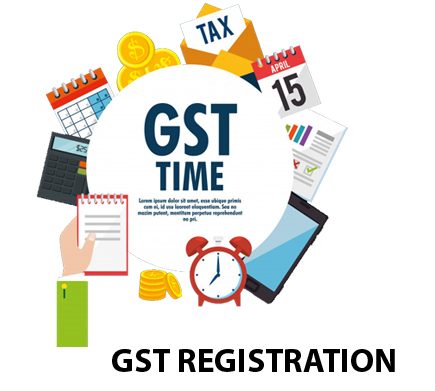
Register GST with us
iNITIAL CONSULTATIONs
Lets talk with our experts to decide the requirement, know the type of registration, and other relevant concerns in this regard.
Registrations
We offers all the kind of GST Registrations and allied services with Minimal time and Minimum Documentations.
post registration consultations
We keeps you updated with the post registration requirements and return filing procedures
Our Pricing starts from following*

Individual/Proprietor
Registration service for Individuals/proprietorship firms
- Documentations
- Registrations
- Generation of User ID and PW

Partnership Firms
Registration service for Partnership Firms
- Documentations
- Registrations
- Initial Consultations

Companies and LLPs
Registration service for Companies/LLPs
- Initial Consultations
- Documentations
- Registrations
Fill Up the form and our team will get back to you within 24 hrs

FAQ
Most frequent questions and answers
GST registration can be obtained voluntarily by any person or entity irrespective of turnover. GST registration becomes mandatory if a person or entity sells goods or services beyond a certain turnover.
Service Providers: Any person or entity who provides service of more than Rs.20 lakhs in aggregate turnover in a year is required to obtain GST registration. In special category states, the GST turnover limit for service providers has been fixed at Rs.10 lakhs.
Goods Suppliers: As per notification No.10/2019 any person who is engaged in the exclusive supply of goods whose aggregate turnover crosses Rs.40 lakhs in a year is required to obtain GST registration. To be eligible for the Rs.40 lakhs turnover limit, the supplier must satisfy the following conditions:
- Should not be providing any services.
- The supplier should not be engaged in making intra-state (supplying goods within the same state) supplies in the States of Arunachal Pradesh, Manipur, Meghalaya, Mizoram, Nagaland, Puducherry, Sikkim, Telangana, Tripur and Uttarakhand.
- Should not be involved in the supply of ice cream, pan masala or tobacco.
If the above conditions are not met, the supplier of goods would be required to obtain GST registration when the turnover crosses Rs.20 lakhs and Rs.10 lakhs in special category states.
Special Category States: Under GST, the following are listed as special category states – Arunachal Pradesh, Assam, Jammu and Kashmir, Manipur, Meghalaya, Mizoram, Nagaland, Sikkim, Tripura, Himachal Pradesh and Uttarakhand.
Aggregate Turnover: Aggregate turnover = (Taxable supplies + Exempt Supplies + Exports + Inter-State Supplies) – (Taxes + Value of Inward Supplies + Value of Supplies Taxable under Reverse Charge + Value of Non-Taxable Supplies).
Aggregate turnover is calculated based on the PAN. Hence, even if one person has multiple places of business, it must be summed to arrive at the aggregate turnover.
There are various types of GST registration like regular, casual taxable persons, non-resident taxable persons and eCommerce operators. Casual taxable persons, non-resident taxable persons and eCommerce operators are required to obtain GST registration irrespective of turnover limit.
Regular: When the threshold limit of Rs. 20 lakhs & Rs. 40 lakhs in service turnover & products turnover respectively is reached, GST registration is mandatory. The exception to this rule is that, when the turnover of the preceding year does not exceeds Rs. 75 lakhs for some states, and then it can choose this scheme. The states are: Arunachal Pradesh, Manipur, Meghalaya, Mizoram, Nagaland, Sikkim, Tripura, and Uttarakhand. The taxpayers under the regular GST will have to file returns monthly. It gives the benefit of input tax credit of GST paid on purchase of both services & products
Composition: The composite GST scheme was introduced to benefit the small businesses. The business whose turnover does not exceed Rs. 1.5 crores, the seller must be charged with:
- @ 1% of turnover by traders;
- @ 2% of turnover by manufacturers;
- @ 5% of turnover for restaurants;
- @ 6% of turnover for service providers.
The tax must be paid by the dealer out of his pocket and thus, cannot issue tax invoice. The scheme gives for minimal compliance and the taxpayers are not required to maintain the account books.
Casual Taxable Persons: The GST Act defines as a casual taxable person as a person who occasionally supplies goods or services in a State or a Union territory where the entity has no fixed place of business. Hence, persons running temporary businesses in fairs or exhibitions or seasonal businesses would fall under casual taxable person under GST.
Non-resident Taxable Persons: Non-resident taxable person (NRI) under GST is any person or business or not-for-profit supplying goods or services but have no fixed place of business or residence in India. Thus, any foreign person or foreign business or organisation supplying goods or services to India would be a non-resident taxable person – requiring compliance with all GST regulations in India.
E-Commerce Operators: Electronic commerce operator is every person who, owns, operates or manages digital or electronic facility or platform for electronic commerce. Thus, any person selling through the internet can be termed as an eCommerce Operator requiring GST registration irrespective of business turnover.
Sole proprietor / Individual
- PAN card of the owner
- Aadhar card of the owner
- Photograph of the owner (in JPEG format, maximum size – 100 KB)
- Address proof
- Self-owned property – Copy of electricity bill, landline bill, water bill, municipal khata copy, property tax receipt.
- Rented property – Rent agreement and No objection certificate (NOC) from the owner of the rented property.
- Bank account details- a copy of the cancelled cheque, the front page of passbook or bank statement
LLP and Partnership Firms
- PAN card of all partners (including managing partner and authorized signatory)
- Copy of partnership deed
- Photograph of all partners and authorised signatories (in JPEG format, maximum size – 100 KB)
- Address proof of partners (Passport, driving license, Voters identity card, Aadhar card etc.)
- Aadhar card of authorized signatory
- Proof of appointment of authorized signatory
- In the case of LLP, registration certificate / Board resolution of LLP
- Address proof
- Self-owned property – Copy of electricity bill, landline bill, water bill, municipal khata copy, property tax receipt.
- Rented property – Rent agreement and No objection certificate (NOC) from the owner of the rented property.
- Bank account details- a copy of the cancelled cheque, the front page of passbook or bank statement
HUF
- PAN card of HUF
- PAN card and Aadhar card of Karta
- Photograph of the owner (in JPEG format, maximum size – 100 KB)
- Address proof
- Self-owned property – Copy of electricity bill, landline bill, water bill, municipal khata copy, property tax receipt.
- Rented property – Rent agreement and No objection certificate (NOC) from the owner of the rented property.
- Bank account details- a copy of the cancelled cheque, the front page of passbook or bank statement
Company (Public and Private) (Indian and foreign)
- PAN card of Company
- Certificate of incorporation given by Ministry of Corporate Affairs
- Memorandum of Association / Articles of Association
- PAN card and Aadhar card of authorized signatory. The authorized signatory must be an Indian even in case of foreign companies/branch registration
- PAN card and address proof of all directors of the Company
- Photograph of all directors and authorized signatory (in JPEG format, maximum size – 100 KB)
- Board resolution appointing authorized signatory / Any other proof of appointment of authorized signatory (in JPEG format / PDF format, maximum size – 100 KB)
- Address proof
- Self-owned property – Copy of electricity bill, landline bill, water bill, municipal khata copy, property tax receipt.
- Rented property – Rent agreement and No objection certificate (NOC) from the owner of the rented property.
- Bank account details- a copy of the cancelled cheque, the front page of passbook or bank statement
© 2025 All Rights Reserved.
